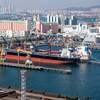Thomas L. Sansonetti, Assistant Attorney General for the Justice Department’s Environment and Natural Resources Division, and Paula D. Silsby, the U.S. Attorney for the District of Maine, announced that late yesterday two chief engineers for a freighter pled guilty for their role in concealing the overboard dumping of waste oil from the M/V Kent Navigator and using false log books designed to deceive the U.S. Coast Guard. The defendants, Chief Engineers Felipe B. Arcolas and Alfredo D. Lozada, worked aboard the Kent Navigator, which is owned and managed by Petraia Maritime Ltd.
The government’s investigation began when the U.S. Coast Guard received an anonymous tip that a vessel bound for Portland was illegally discharging its waste oil and its bilges while at sea. MARPOL, which is a treaty ratified by the United States, and U.S. law limit the oil content of discharges from ships to not more than 15 parts per million. Oil pollution control equipment, called an Oil Water Separator, is equipment required by these laws that, when operated correctly, will prevent discharges of oil in excess of 15 parts per million.
The Coast Guard inspected the Kent Navigator when it entered the port and found oily residue in piping that led to overboard discharge valves, and oil pollution control equipment that was inoperable. The Coast Guard’s investigation revealed that while the vessel was at sea, Arcolas and Lozada directed that its waste oil and oily bilges to be pumped directly overboard, and that the ship’s Oil Water Separator, a required pollution prevention device, also be circumvented. These actions led to the discharge of significant quantities of oil into the ocean.
To conceal this activity, Arcolas and Lozada created a false record book, called an Oil Record Book, that made it appear as if the discharges were made using the required pollution control equipment, when in fact they were not. An Oil Record Book is a pollution record required by MARPOL and U.S. law that is regularly inspected and relied upon by the Coast Guard and was presented for review during the Coast Guard’s inspection.
For their creation and presentment of the false records to the Coast Guard during the inspection, each of the defendants faces a maximum penalty of up to five years imprisonment, a fine up to $250,000, and probation for up to three years.
“Individuals who pollute our oceans and then lie about it to our government will be held accountable,” said Assistant Attorney General Sansonetti.
Paula D. Silsby, United States Attorney for the District of Maine, stated that, “This is the second case this summer in which individuals have been prosecuted in Maine for lying about vessel pollution discharges. The integrity of the vessel inspection process, designed to protect the waters of Maine and the world, will continue to be ensured through the swift prosecution of those who create and present false documents to the Coast Guard.”
The investigation was conducted by the U.S. Coast Guard Investigative Service with assistance from the Coast Guard Marine Safety Office, the Coast Guard First District Legal Office, and the Coast Guard Headquarters Office of Investigation and Analysis. The case is being prosecuted by the U.S. Attorney’s Office for the District of Maine and the Environmental Crimes Section of the U.S. Department of Justice. The investigation is continuing.
Sponsored Content
Safer Starts Here: Build Ships, Protect Crews

Subscribe for
Maritime Reporter E-News
Maritime Reporter E-News is the maritime industry's largest circulation and most authoritative ENews Service, delivered to your Email five times per week









